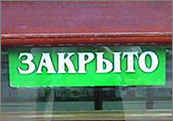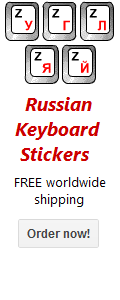 FR FR |
About us | Home | User agreement | Link to us |
Subjunctive and Imperative Mood
In Russian language, along with verbs of indicative mood there are also verbs of subjunctive and imperative mood.Verbs of subjunctive mood designate actions which one wants to happen, or just possible ones, under certain circumstances. A sentence containing subjunctive verbs shows that an action has not happen, but it could have happened if certain circumstances took place. Look at an example:
Я бы пошёл в кино, если бы у меня был билет.
I would have gone to the movie, if I had had a ticket.
Adding the particle "бы", either near a verb, or at any other place in a sentence, forms the subjunctive mood of a verb.
|
Remember: The particle
"бы" and a
verb are always written separately: |
The verbs of subjunctive mood change in number:
двигался бы - singular
двигались бы - plural
At the same time, singular verbs change in person.
он двигался бы - he would have moved
она двигалась бы - she would have moved
оно двигалось бы - it would have moved
In other words, the verbs of subjunctive mood are usually predicates and agree with a subject in person and number.
subject
Старик
и сейчас неpredicate
стал бы вырубать кусты.
|
Remember: The verbs in
subjunctive mood are always in the past tense. |
Next page
> Imperative Mood of Russian Verbs > Page 1, 2
Got questions?
Ask them in the Russian Questions and Answers — a place for students, teachers and native Russian speakers to discuss Russian grammar, vocabulary, pronunciation, and other aspects of the Russian language.
Copyright 2001-2026 MasterRussian.com | Privacy Policy | Contact Us
 Russian Lessons
Russian Lessons
- Russian alphabet
- Names of letters
- Russian Q&A new
- Pronunciation: Cons.
- Pronunciation: Vowels
- Noun Gender/Number
- Cases of Nouns
- Russian Greetings
- Personal Pronouns
- Learning Russian
- 1000 Common Words
- 500 Russian Verbs
- Top Russian Nouns
- » All lessons
- » Guest lessons
 Browse Topics
Browse Topics
- Start learning Russian
- Forum
- Bookstore
- Dictionaries
- Russian - basic
- Russian - adv
- Pronunciation
- Russian Blog new
- Reading
- Test & quizzes
- Translation
- Verbs
- Verb Conjugations
- Russian numbers
- Russian Tests new
- Vocabulary
- Writing
- Folk music
- Fun stuff
- Leo Tolstoy
- Learner's lore
- Literature
- Personal blogs
- Picture Dictionary new
- Proverbs
- Publications
- Radio & TV
- Russian culture
- Schools in Russia
- Russian Words
- Russian names
- Software
- Russian Words iPhone
Clicks the "Like" button below to get daily updates on Facebook!
Click "Add to circles" to learn Russian on Google+

Search MasterRussian

English » Russian dictionary

WORD OF THE DAY
![]() RSS
|
iGoogle
|
My Yahoo!
RSS
|
iGoogle
|
My Yahoo!
Meaning: to be able to, can, may
Pronunciation: [mohch']
Learn Russian words! »
TODAY'S STREET SIGN

Russian: Закрыто
English: Closed
FOLLOW US ON TWITTER

MasterRussian on Twitter


